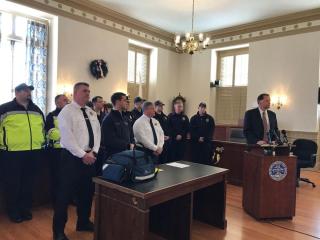Weymouth, State Officials Warn Residents about Escalating Carbon Monoxide Incidents During Heating Season

Weymouth Mayor Robert Hedlund, Weymouth Fire Chief Keith Stark, South Shore Health EMS Medical Director Dr. William Tollefsen, and State Fire Marshal Peter J. Ostroskey came together on December 12th to remind the public of important steps they can take to prevent carbon monoxide (CO) poisoning.
The Weymouth Fire Department and South Shore Health EMS responded to a call last month for a woman having chest pains. When they arrived, carbon monoxide detectors affixed to both the Firefighters’ and EMTs’ medical bags sounded and it became evident that the occupant’s symptoms were likely associated with CO poisoning. Weymouth firefighters confirmed that CO levels were above 400 parts per million, a life-threatening indicator. Weymouth Firefighters immediately evacuated the residents then donned their personal protective equipment, shut down the gas-fueled furnace and water heater, and ventilated the home.
“Weymouth is proud of our first responders, South Shore Health EMS, the Weymouth Fire Department and the Weymouth Police Department, who were able to help a family in town and prevent what could have been a serious tragedy. This serves as a reminder to residents that small steps can prevent incidents and save lives,” said Mayor Hedlund.
“Breathing CO makes people feel nauseas, dizzy, head-achy and tired, like having the flu,” said Dr. William Tollefsen of South Shore Health. It poisons the body by removing oxygen in the blood stream, slowly suffocating victims.”
“With another winter upon us, this is the time to make sure that every home has working CO alarms to help keep ourselves and our families safe,” said Mayor Hedlund. In Weymouth, town officials and firefighters have partnered with the American Red Cross to help residents obtain and install smoke alarms and CO alarms. Residents may schedule a smoke and CO alarm inspection online at: https://www.weymouth.ma.us/fire-department/pages/smoke-alarm-scheduling or by contacting the Weymouth Fire Prevention Division.
“Heating is the number one cause of high levels of CO in the home,” said Weymouth Fire Chief Keith Stark. Be sure to hire a professional to perform maintenance and an annual checkup of your chimney and furnace, and remember to never disconnect CO or smoke alarms.”
“This winter, be sure to keep warm and keep safe by making sure you have working carbon monoxide alarms on every level of your home,” State Fire Marshal Peter J. Ostroskey said. Replace the batteries at least once a year and replace alarms before the end of their lifecycle.” The Department of Fire Services has tips on winter heating safety at: www.mass.gov/keepwarmkeepsafe.
“We encourage homeowners to maintain and check on their heating equipment, install working smoke alarms and carbon monoxide alarms, as well as reach out to the Town or Fire Department if you need assistance,” said Weymouth Mayor Robert Hedlund. We offer an installation program for seniors and the Weymouth Fire Department is available to provide information, resources, and assistance to residents.”
Local fire departments are available to help homeowners who might need guidance on CO alarm installation or changing batteries. Carbon monoxide is called the invisible killer because you cannot see it, taste it, or smell it. Without appropriate carbon monoxide alarms, people can mistake the physical warning signs of CO poisoning for other ailments. Last year, Massachusetts firefighters and other first responders were called to nearly 16 thousand carbon monoxide related incidents. Thirty percent of those responses involved dangerous levels of CO in homes and other dwellings.
Recently in Ware, a man died from carbon monoxide poisoning and another adult was treated after they fell ill in their home. A woman had called 911 and told a dispatcher someone at the lakeside home might be having a heart attack. The cause was a faulty coal stove. Additionally, in recent weeks, two families in a North Andover duplex had high levels of CO in their home from a faulty water heater installation. Fortunately, both families had brand new CO alarms in their homes and were warned of the danger.
State and local fuel assistance programs are helpful resources for low-income homeowners. They can assist with maintenance of furnaces, for example, even if they do not qualify for or need actual fuel assistance. Be sure to contact the Weymouth Fire Department for more information on CO safety or with any questions on installation.

